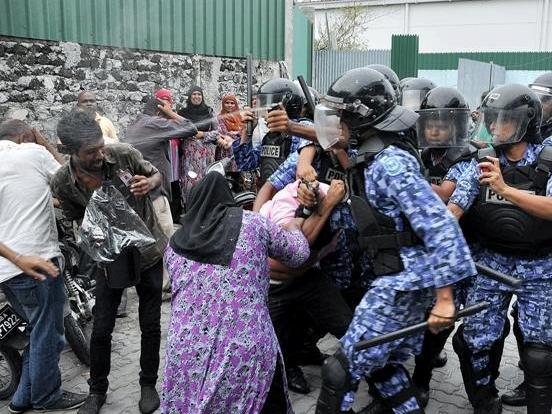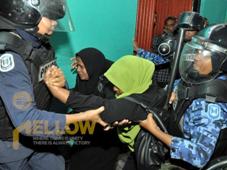Additional reporting by JJ Robinson
Despite recent government assurances that Indian investments in the Maldives would be protected, parties in the now ruling coalition have renewed calls for the airport to be nationalised.
Indian infrastructure company GMR has meanwhile informed staff that it will pay 50 percent of employee salaries in US dollars from July onwards, as part of the new employee benefits scheme. Further benefits announced include the payment of Ramadan bonuses in US dollars, and a profit-sharing scheme awarding employees a one percent share of the company’s profits from 2011.
The decision follows a week in which former opposition parties – now in a coalition government following the controversial transfer of power of February 7 – sent replies to President Mohamed Waheed Hassan’s request for opinions on the airport, the development and management of which was taken over by GMR in 2010 in a 25 year concession agreement signed with the now-opposition government.
The pro-government parties – including the Dhivehi Rayithunge Party (DRP), Dhivehi Qaumee Party (DQP), People’s Alliance (PA) and Jumhoree Party (JP) – advised Waheed that they continued to endorse an agreement signed in June 2010 calling for the airport to be taken back from GMR and nationalised – the ‘Joint Statement by political parties opposing government’s efforts to hand over the Male’ International Airport to a foreign party’.
The agreement endorsed six main points which included taking legal action to prevent the government’s decision to award the contract to GMR.
GMR’s contract is currently under scrutiny by a committee appointed by President Waheed, which includes the Attorney General, the Finance Minister and the CEO of Maldives Airports Company Ltd (MACL).
A delegation from the International Finance Corporation (IFC) – a member of the World Bank group and the largest global institution focused on private sector in developing countries, which brokered the deal between GMR and the government of Maldives – recently addressed the government’s concerns over the concession agreement in a meeting with senior government officials.
The DQP – a small but extremely vocal party which has consistently opposed the airport deal and filed court cases against it – today accused the IFC of mishandling the bid evaluation report of the airport privatisation agreement. A 24-page book released by the DQP while it was in opposition presents the government’s lease of Ibrahim Nasir International Airport (INIA) to developer GMR as a threat to local industry that will “enslave the nation and its economy”.
“IFC is a company associated with GMR in many other projects. It is clear that IFC had issued loans to GMR on other projects. We believe that the government selected IFC to facilitate GMR for the airport project,” an anonymous party source told newspaper Haveeru.
President’s Office Spokesman Abbas Adil Riza said the airport contract is “an important national issue” which “must be dealt with after discussions with coalition partners.”
However, speaking at the ceremony to mark the 100th day of his administration, President Waheed said he did not wish to involve “political disputes” in reviewing the GMR contract and that foreign investments must be handled as business dealings.
“I do not believe bringing in our political quarrels into the GMR issue will be good for our future and our economy,” said the President.
During President Waheed’s recent trip to India, he also assured Indian Prime Minister Manmohan Singh that the Maldives government would adhere to all agreements between Indian and Maldivian businesses and expressed the Maldives’ desire for further Indian investment in the country.
“My government is a continuation of the previous government under then President Nasheed, and hence there should be no doubt on this score,” he was quoted as telling Manmohan Singh in the Daily News.
In addition, during the India trip, Maldives Foreign Minister Dr Abdul Samad Abdulla assured his Indian counterpart that all existing investment agreements would be honoured despite the change of government on February 7.
According to Indian newspaper The Hindu, Samad assured Indian External Affairs Minister S.M. Krishna that the government’s policy was unchanged, after his counterpart expressed the desire that the Maldives remained friendly to outside investors.
Hostile politics
Despite these assurances, the revelation that major political parties now in government continue their endorsement of airport nationalisation, and challenging of the IFC’s competency, could increase tensions between the government and GMR and weaken investor confidence in the Maldives – at nearly US$500 million, the airport concession agreement is the country’s single largest foreign investment.
Declining to comment on the official standing of Dhivehi Rayyithunge Party (DRP) on the GMR deal, the party’s Deputy Leader Dr Abdulla Mausoom said the DRP was against privatising “assets of national importance”.
Jumhoree Party (JP) Spokeman Moosa Rameez said the party had written to the President stating their wish to adhere to the agreement signed between the then opposition parties.
Although the parties in the government had expressed several concerns including “threats to national security” in “giving away the airport to foreigners”, the government’s current concerns are focused on the disputed concession fees in the agreement.
Under the concession agreement in the GMR contract, a US$25 charge was to be levied as an airport development charge (ADC) on all outgoing passengers to part-fund the infrastructure project.
However, while in opposition, the DQP – which today forms part of Waheed’s national unity government – filed a successful case in the Civil Court in December 2011 to block the payment of the charge, on the grounds that it was effectively a tax not approved by parliament.
Nasheed’s government had agreed to deduct the ADC from the concession fees payable by GMR while it sought to appeal to verdict. As a result, Dr Waheed’s government received only US$525,355 from the airport for the first quarter of 2012, compared to the US$8.7 million it was expecting.
In April, Finance Minister Abdulla Jihad declared that the Maldives Airport Company Limited (MACL) would be unable to continuing paying the ADC without risking bankruptcy.
The Transport Ministry has since ordered GMR to pay the shortfall in concession fees. In response, GMR in early May “expressed a desire to exempt Maldivian citizens from the ADC”, as “the majority of Maldivians travel abroad for the purposes for healthcare and education.”
“The ADC was conceptualised and incorporated into the concession agreement by the government to yield a maximum return to the Maldives while ensuring development of the airport and a reasonable return to the successful bidder,” GMR said, in a statement at the time.
“We are sensitive to the apprehensions expressed regarding ADC; and would like to assure all concerned that the management of GMR Male International Airport is doing everything possible by offering viable options to reduce the impact on the Maldivians, thereby helping the government for the ADC implementation.”
GMR has expressed confidence in the strength of its contract, which has a facility for dispute arbitration in Singapore, as well as an option for the government to buy out the agreement – a cost likely to reach several hundred million dollars.
However the country is already facing a crippling budget deficit of 27 percent, a plunge in expected revenue of 23 percent and an increase in spending of almost 24 percent, a time when investor confidence has been impacted by repeated challenges to the government’s legitimacy by the MDP.
Earlier this week the government refused to comment on claims made in local media by JP Gasim Ibrahim that the Maldives was now bankrupt and already unable to pay some civil servants.


